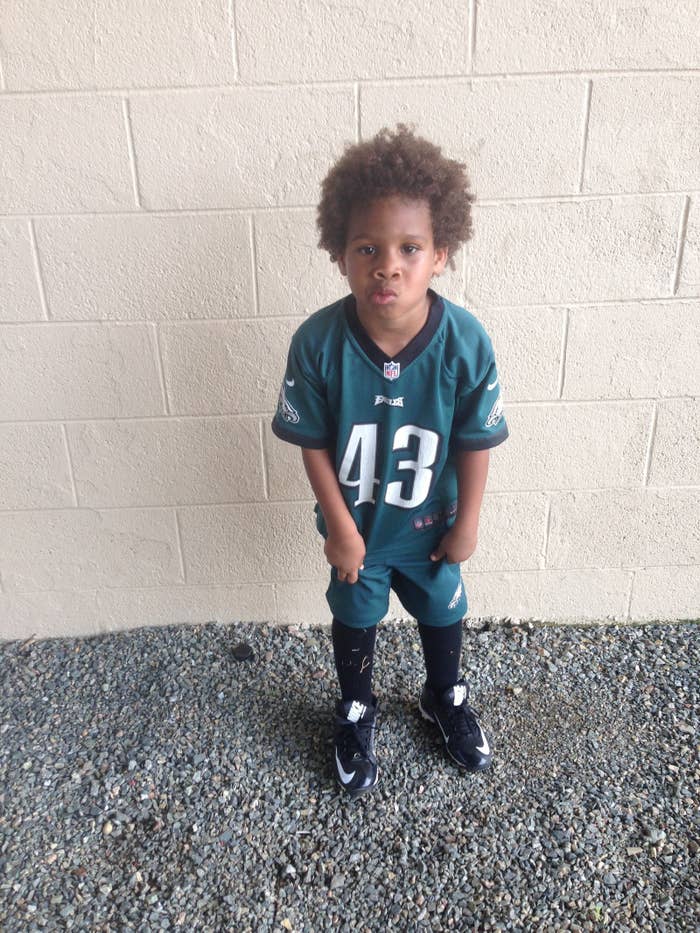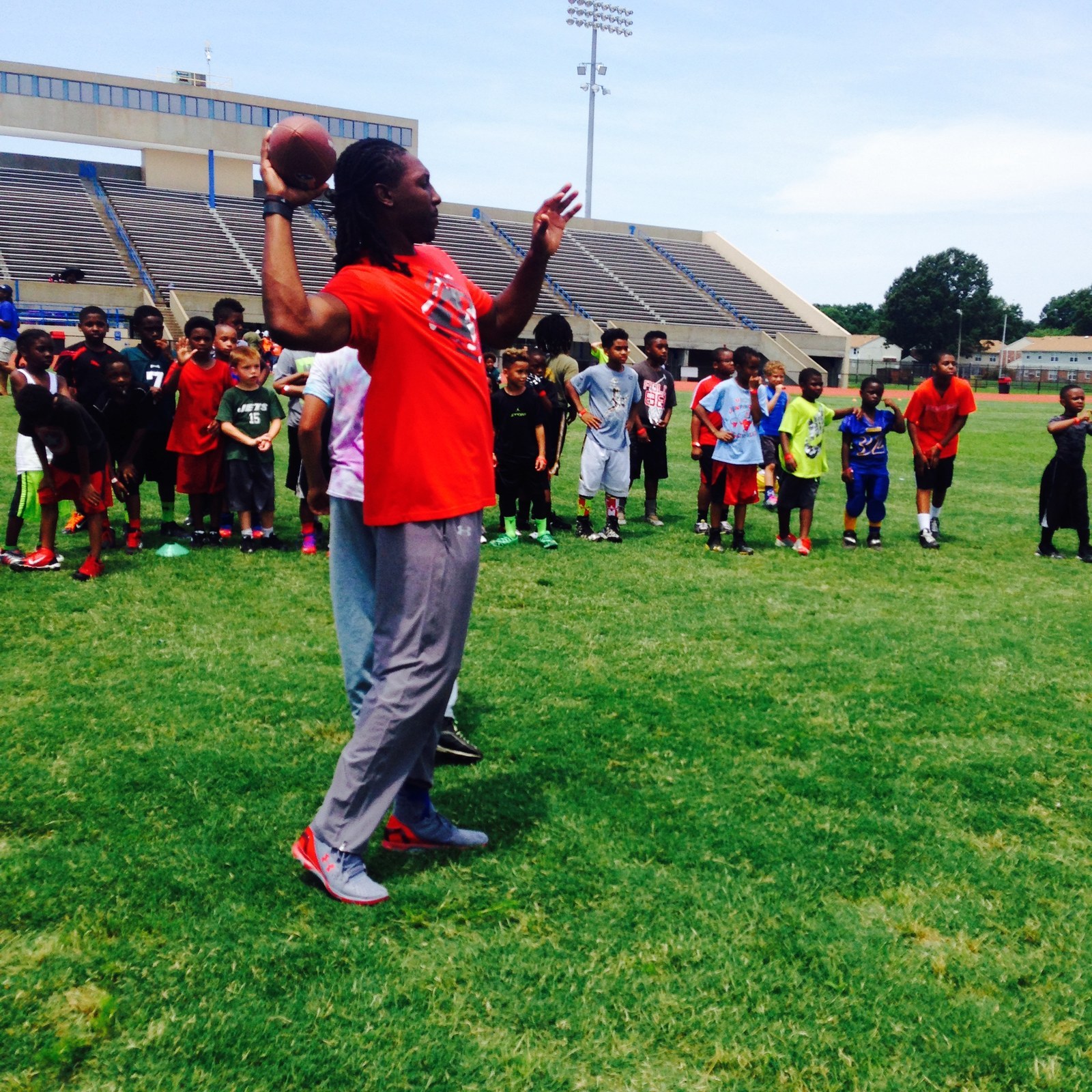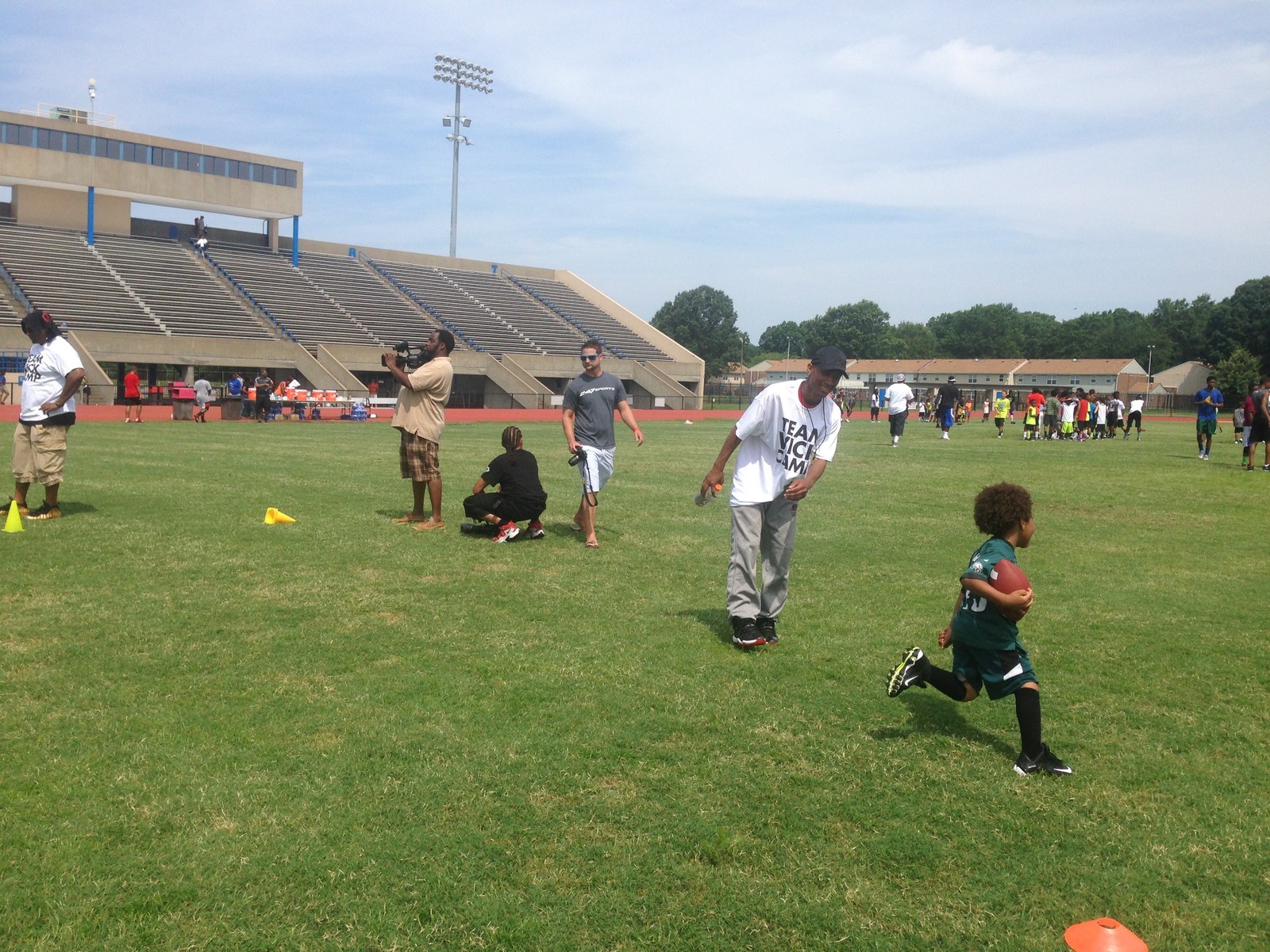
Five-year-old Isaiah Hendricks wandered directionless around the football field at John B. Todd Stadium in Newport News, Virginia, this past Saturday morning.
“Where’s DeSean Jackson?” he wondered aloud to no one in particular.
Hendricks and 175 other children, all between 6 and 17 years old, were there to attend a football mini-camp hosted by quarterback Michael Vick. Vick, the former number one NFL draft pick who returned to the league in 2009 after his conviction for running a multi-state dog-fighting circuit, introduced himself to the assembled children and teens as “the best free agent on the market.” He brought friends and former teammates LeSean McCoy (now with the Buffalo Bills), DeSean Jackson (the Washington Redskins), and Falcons receiver Roddy White, who described Vick as “my dude for over 11 years.”
Vick said he runs the one-day camp in his hometown – now in its second year – to give back to the city that supported him during his trial and subsequent rehabilitation tour and return to the NFL. “Inner-city kids need events like this for structure, they need it for confidence, and they need it for leadership,” he explained, adding that 74 kids participated last year. This time around, 20 had the $75 registration fee waived.
It was a sweltering, sunny morning. The football portion of the camp was chaos. Participants wore various jerseys — but no pads or helmets — and were told to assign themselves into categories such as receivers, running backs, and quarterbacks. Groups were not divided by age, lending to mismatched gaggles of players. The initial squad of offensive linemen, for example, small in number but large in height and build, were joined by a 5-foot-tall redheaded kid whose ambition outmatched his wingspan.

Cones outlined running routes, and Jackson, White, and other coaches handed off the ball as the kids stumbled over their own feet.
“Don’t stop running when you catch it! Keep going!” was shouted more than a few times.
At just over 3 feet tall, Hendricks was probably the shortest player on the field. He spent most of the afternoon being picked on by older kids who cut him in line.
Hendricks didn’t sweat it. Michael Vick is his hero, and his mother, Terrika, giggled as she played a video of Isaiah crying the day Vick was cut from the Philadelphia Eagles. Unfortunately for Hendricks, most of his other favorite players have been recently scrapped from the team too. The Eagles’ Chip Kelly "is not the best coach ever,” the 5-year-old said.
Vick told BuzzFeed News he hopes the football camp will help kids feel supported by their community, like he was. He also places a strong emphasis on helping them make good decisions, build character, and navigate tricky situations as they proceed into adulthood.
This manifested itself in some surprising ways during lunch hour, when Vick, his fellow NFL stars, and some of his closest friends sat down to talk with the high school–age teens.
Vick’s cousin, Dwight, ran an “exercise” in which troublesome scenarios were described and the players advised the teens on how to handle them. Many of the hyper, restless teens were plainly too young to understand the scenarios, but the theme is to teach ‘em when they’re young.

In the first scenario, Dwight described a situation involving a sexual assault on campus in which a top college football recruit attends a party with some other prospective players. Other partygoers tell the recruit that there’s “a girl upstairs.” But he elects to go home instead of pursue a sexual encounter. “The next day,” Dwight said, “you hear she’s alleging she was raped by the host of the party. What do you do?”
The teenage boy who was chosen to give a response said he “wouldn’t want to disrespect anyone, but I wouldn’t rat out anyone.”
The professionals shook their heads — then offered only vague advice. “Try not to end up in that situation,” said Vick. “When something sounds like a good time but you know deep down in your heart that it’s bad, you’ve gotta walk away.”
It was a topical question; Jameis Winston, the first-overall pick in the 2015 NFL draft, has long faced allegations that he raped a woman at Florida State during his freshman year. But other than Vick’s suggestion to “avoid situations,” the young player’s suggestion not to “rat out” a prospective teammate was left hanging out there. No one offered any more, seemingly necessary, specific guidance.
Other scenarios involved friends smoking weed and teammates taking “pills” — in each exercise, the prospective recruit was assumed to have abstained.
One high schooler said players have to be vigilant in “choosing who you hang out with.” Vick loved this. He shot to his feet, asked the kid to identify his parents, who were standing in the back of the room with the other adults, and told them they’ve “done a great job” raising their son.
Young prospective athletes struggle immensely with “decision making,” Vick told BuzzFeed News later. “I think there’s a lot of peer pressure, a lot of influencing, and you’ve just gotta be able to overcome those obstacles in life.”
When asked what he’d tell kids if his own career were used as an example, Vick said he “couldn’t really tell them anything” because dog fighting is universally understood to be morally wrong. “It’s not an excuse, but I think if somebody would have told me, ‘These are the rules,’ it probably would never have happened,” he said.

The panelists, who, along with most of the participants, were black, also discussed the current issues concerning race in America. Three days earlier and two states away in Charleston, South Carolina, 21-year-old white supremacist Dylann Roof allegedly killed nine black people during a Bible study at a historic church. The Charleston shooting is the most recent tragedy in a two-year series of highly public murders of black Americans — many at the hands of white police officers — that have rekindled pointed questions about racial equality in the United States.
During the camp, White, who is from Charleston, declined an opportunity to discuss the news from his hometown.
For a few attendees, grief over another shocking death led to their participation in the camp. In August 2014, Lennon Lacy, a 17-year-old football player in Bladenboro, North Carolina, was found hanging from a swing set near a mobile-home park. His death was originally ruled a suicide, but the FBI is investigating other explanations, including lynching. (The FBI didn't immediately respond to a request from BuzzFeed News.)
Felisa Brown, a North Carolina–based paralegal whose firm is representing Lacy’s family, brought a few of his teammates to the football camp to “give them a break” from grieving. “It’s so tough to talk to them about this kind of stuff,” Brown said.
At the end of the lunchtime discussion, LeSean McCoy, who recently spoke his mind on Eagles coach Chip Kelly cutting “all the good black players,” spoke passionately about how black players are portrayed in the news.
“One mistake and [the media will] make you look like a gangster,” said McCoy. “It’s especially important for a black player. Make one mistake and they’ll turn on you.”
The kids, now restless, shuffled in their seats and chattered with each other.
“Please pay attention,” McCoy pleaded. “This is important.”
Elton Brown, a guard who played at the University of Virginia and for the Arizona Cardinals, said, “It’s a different world now. Be careful who you hang with and be careful of where you go.”
